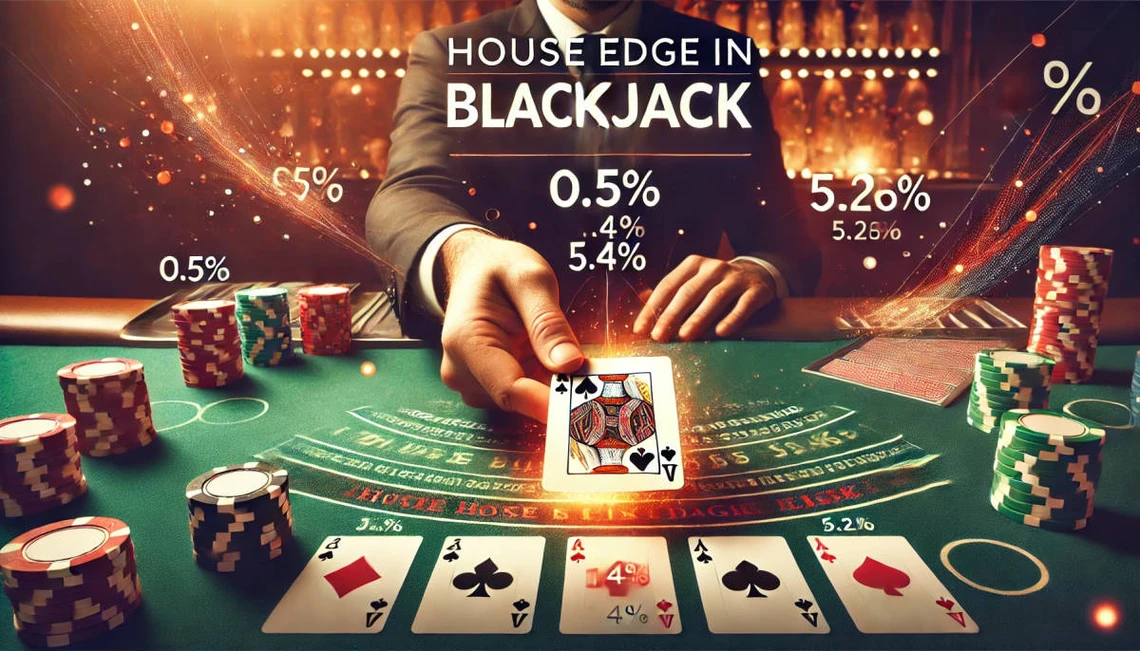
What to Know About the House Edge in Blackjack?

If you’ve ever played blackjack at a casino, you may have wondered why the odds always seem to favor the house. This is due to a fundamental concept known as the house edge. The house edge is a built-in advantage that ensures the casino will profit over time.
However, blackjack is unique among casino games because the house edge is not fixed—it depends on the game rules and the player's decisions. In this article, we’ll break down how the house edge works, what factors influence it, and how players can minimize it.
What Is the House Edge?
The house edge is the percentage of each bet that the casino expects to win over the long term. It represents the mathematical advantage the house has over the player.
For example:
- If a game has a house edge of 5%, it means that for every £100 wagered, the player will lose an average of £5 in the long run.
This does not mean a player will lose exactly that amount every time they bet. Short-term wins and losses fluctuate, but over thousands of hands, the house edge ensures the casino remains profitable.
Why Does the Casino Have an Edge in Blackjack?
Unlike games such as roulette or slot machines, blackjack is a game of skill as well as luck. The house edge in blackjack comes from several key factors:
1. Players Act First
One of the biggest reasons the house has an edge is that players must act before the dealer. If a player busts (exceeds 21), they lose immediately—even if the dealer later busts in the same round. This rule alone gives the casino a significant advantage.
2. Rule Variations Affect the House Edge
Different blackjack games have different rules, and these variations directly affect the house edge. Some rules favor the player, while others benefit the casino.
How Different Rules Impact the House Edge
The standard house edge in blackjack—when using basic strategy—is around 0.5%. However, specific rule changes can increase or decrease this advantage.
Here’s how different blackjack rules affect the house edge:
1. Payout for a Natural Blackjack
- 3:2 payout (Traditional rule) → House edge: 0.5%
- 6:5 payout (Worse for players) → Increases house edge by 1.4%
💡 Why it matters: If blackjack pays 6:5 instead of 3:2, you win less money when hitting a natural 21, increasing the casino's advantage.
2. Dealer Hits or Stands on Soft 17
- Dealer stands on soft 17 (S17) → House edge: 0.5%
- Dealer hits on soft 17 (H17) → Increases house edge by 0.2%
💡 Why it matters: When the dealer is allowed to hit on soft 17, they have an extra chance to improve their hand, slightly increasing their advantage.
3. Number of Decks Used
- Single deck → House edge: 0.17%
- Double deck → House edge: 0.46%
- Six decks (standard) → House edge: 0.64%
- Eight decks → House edge: 0.66%
💡 Why it matters: More decks generally increase the house edge. However, casinos often tweak other rules in single- and double-deck games to offset the lower house edge.
4. Doubling Down Rules
- Double down allowed on any two cards → Standard house edge
- Restricted doubling (e.g., only on 9-11) → Increases house edge by 0.1% to 0.2%
💡 Why it matters: The ability to double down freely gives players more opportunities to maximize their winnings. When restrictions apply, it slightly increases the casino’s edge.
5. Surrender Options
- Early surrender → Reduces house edge by 0.6%
- Late surrender → Reduces house edge by 0.1%
- No surrender → Standard house edge
💡 Why it matters: Early surrender (where you can fold before the dealer checks for blackjack) is the most favorable rule for players. However, most casinos only offer late surrender, which has a smaller effect on the house edge.
How Blackjack Compares to Other Casino Games
Blackjack has one of the lowest house edges in the casino—if played correctly. Here’s how it compares to other popular casino games:
|
Casino Game
|
House Edge (Average)
|
|---|---|
|
Blackjack (optimal play) |
0.5%
|
|
European Roulette |
2.7%
|
|
American Roulette |
5.26%
|
|
Baccarat (Banker bet) |
1.06%
|
|
Craps (Pass Line) |
1.41%
|
|
Slot Machines |
2% – 10%
|
💡 Why it matters: Blackjack gives players one of the best chances to win compared to other games—if they use proper strategy.
Can Players Overcome the House Edge?
While the house always has some advantage, skilled players can minimize the house edge by:
✔ Using basic blackjack strategy (reduces house edge to ~0.5%)
✔ Playing games with favorable rules (e.g., 3:2 blackjack, S17, fewer decks)
✔ Card counting (in live games, though casinos monitor for this)
What About Card Counting?
Card counting does not eliminate the house edge, but it can give players a small advantage over the casino. However, most casinos combat this with:
- Multiple decks
- Automatic shufflers
- Banning suspected counters
Final Thoughts: How to Play Smart and Reduce the House Edge
The house edge in blackjack is one of the lowest in the casino, but it still guarantees the casino will win in the long run. However, by understanding how different rules and strategies affect the game, players can:
✅ Choose games with favorable rules
✅ Use optimal blackjack strategy
✅ Reduce the house edge as much as possible
By making smart decisions, you can’t eliminate the house edge, but you can make your money last longer and give yourself the best chance to win!

Author
Content Writer